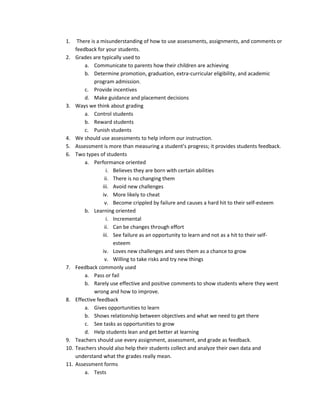Recommended
Recommended
More Related Content
What's hot
What's hot (20)
Investigation into Elementary Art Common Assessments

Investigation into Elementary Art Common Assessments
Overcoming A Legacy Of Mistaken Assessment Beliefs

Overcoming A Legacy Of Mistaken Assessment Beliefs
Introduction To Dealing With Difficult, Defiant And Unmotivated Students Adams

Introduction To Dealing With Difficult, Defiant And Unmotivated Students Adams
PERI Holistic Assessment Seminar 2010 Presentation Slides

PERI Holistic Assessment Seminar 2010 Presentation Slides
Viewers also liked
Viewers also liked (8)
E-Learning for Microsoft Business Certification_TestingCenters

E-Learning for Microsoft Business Certification_TestingCenters
Similar to Nwhtys principle 5 proj
Here are 6 points that you should know about Letter Grades; 1. The use of letters to grade students is deceptive. 2. Teachers don't like letter grades 3. It's not true that letter grades signify what you believe they imply. 4. What about pupils earning a C? Letter Grades: 6 Important Points You Should Know | Future Education Magazine

Letter Grades: 6 Important Points You Should Know | Future Education MagazineFuture Education Magazine
Similar to Nwhtys principle 5 proj (20)
Re-assessing assessment: Key principles and strategies

Re-assessing assessment: Key principles and strategies
Letter Grades: 6 Important Points You Should Know | Future Education Magazine

Letter Grades: 6 Important Points You Should Know | Future Education Magazine
Nwhtys principle 5 proj
- 1. 1. There is a misunderstanding of how to use assessments, assignments, and comments or feedback for your students. 2. Grades are typically used to a. Communicate to parents how their children are achieving b. Determine promotion, graduation, extra-curricular eligibility, and academic program admission. c. Provide incentives d. Make guidance and placement decisions 3. Ways we think about grading a. Control students b. Reward students c. Punish students 4. We should use assessments to help inform our instruction. 5. Assessment is more than measuring a student’s progress; it provides students feedback. 6. Two types of students a. Performance oriented i. Believes they are born with certain abilities ii. There is no changing them iii. Avoid new challenges iv. More likely to cheat v. Become crippled by failure and causes a hard hit to their self-esteem b. Learning oriented i. Incremental ii. Can be changes through effort iii. See failure as an opportunity to learn and not as a hit to their self- esteem iv. Loves new challenges and sees them as a chance to grow v. Willing to take risks and try new things 7. Feedback commonly used a. Pass or fail b. Rarely use effective and positive comments to show students where they went wrong and how to improve. 8. Effective feedback a. Gives opportunities to learn b. Shows relationship between objectives and what we need to get there c. See tasks as opportunities to grow d. Help students lean and get better at learning 9. Teachers should use every assignment, assessment, and grade as feedback. 10. Teachers should also help their students collect and analyze their own data and understand what the grades really mean. 11. Assessment forms a. Tests
- 2. b. Performance tasks c. Oral presentation 12. Daily formal and informal assessment opportunities a. Student-to-student interactions b. Teacher-student interactions c. Choral responses d. Discussions e. Student questions f. Other manifestations of students understanding 13. Checking for understanding a. One question quizzes b. Exit cards c. Practice exercises d. Lab notes e. Teacher observation f. Homework and worksheets 14. Teachers should use a variety of assessment techniques to obtain more accurate feedback.
